AWM41 1021 - [Nurses Narratives] Sister Violet Minnie Payne
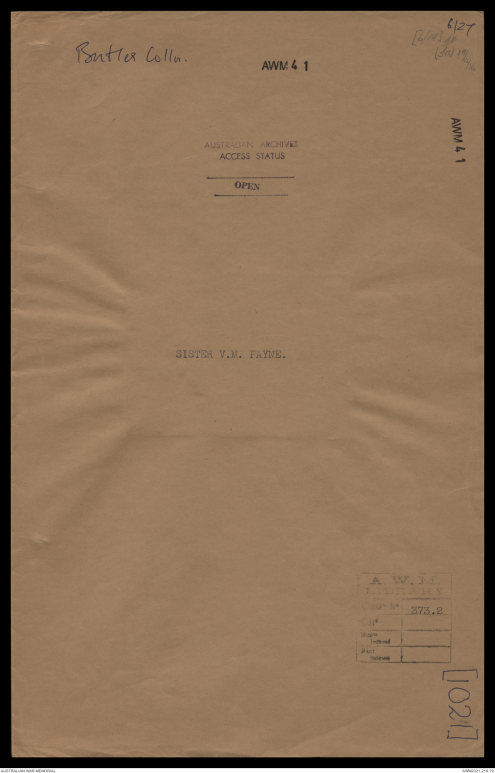
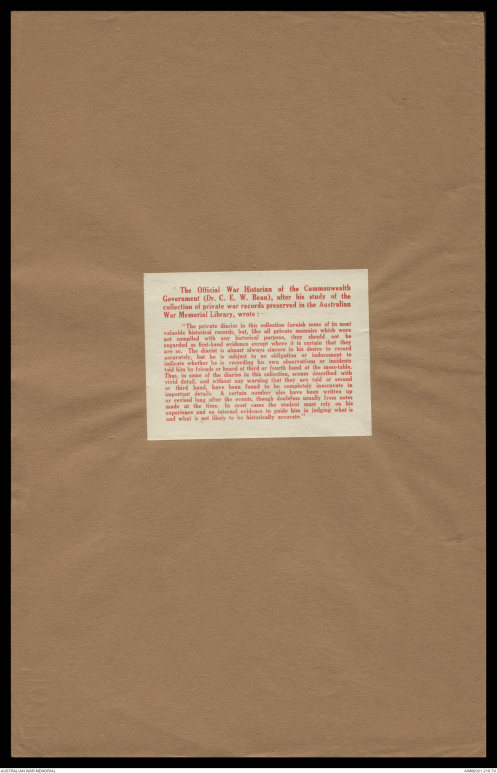
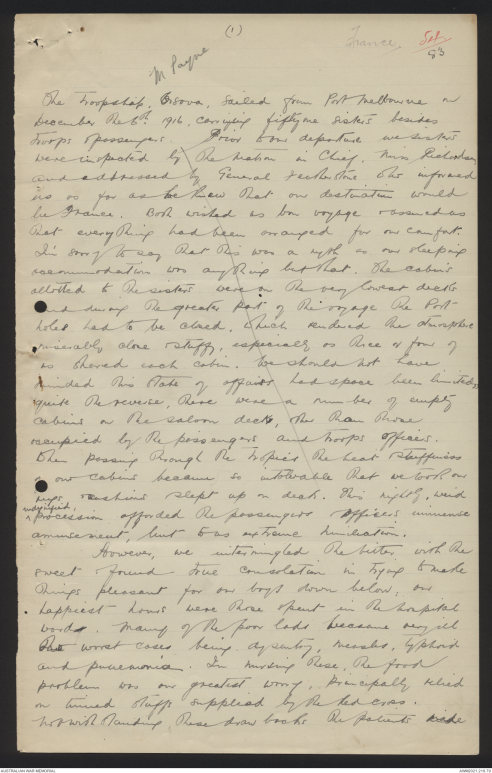
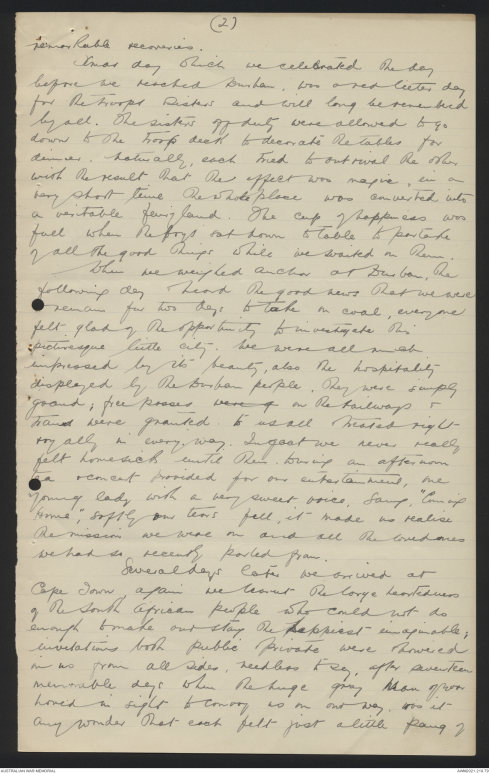
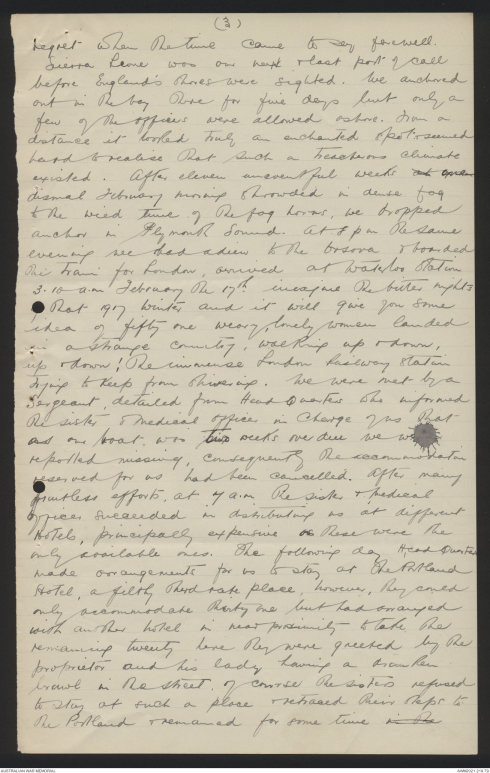
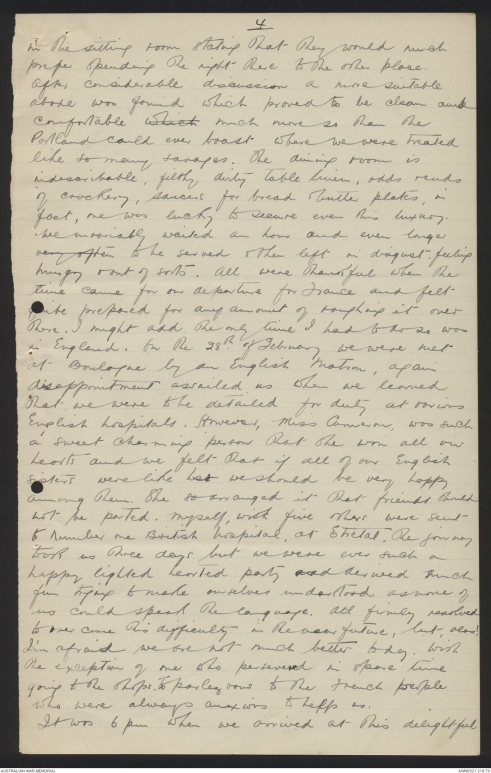
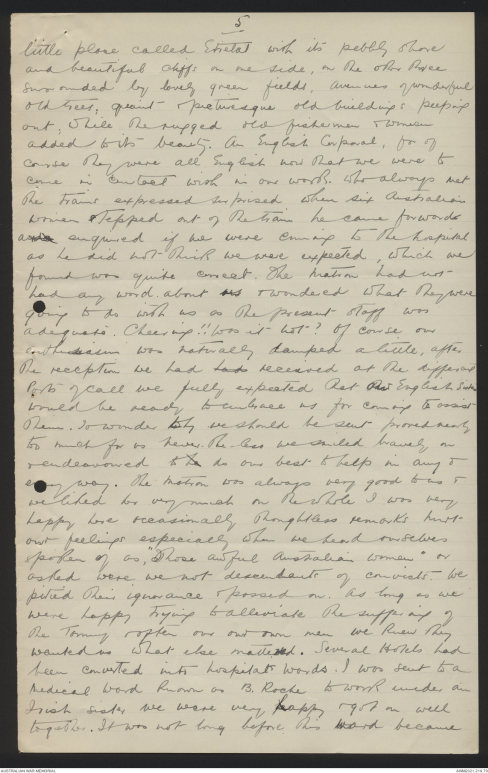
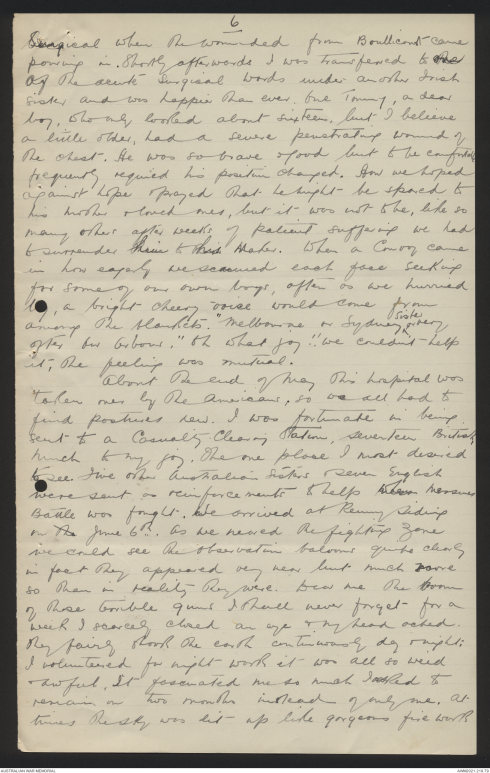
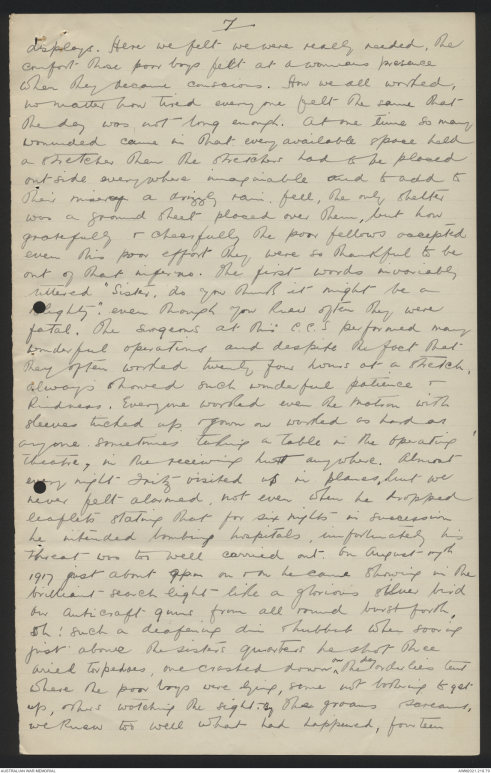
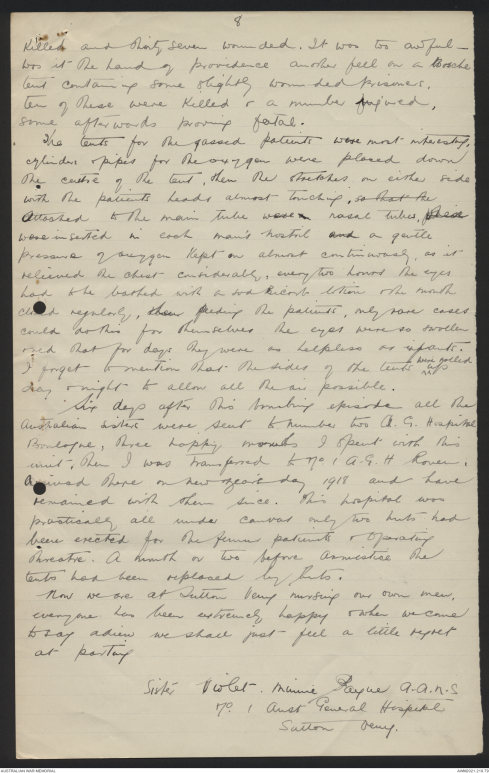
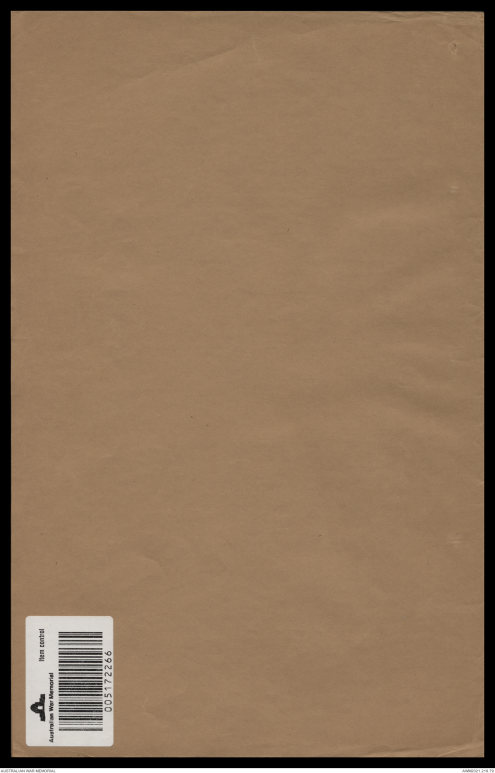
6/27
[[?]]
(3rd) 19/12/16
Butler Colln.
AWM 41
[*AWM 41*]
AUSTRALIAN ARCHIVES
ACCESS STATUS
OPEN
SISTER V.M. PAYNE.
A.W.M.
LIBRARY
373.2
[1021]
The Official War Historian of the Commonwealth
Government (Dr. C. E. W. Bean), after his study of the
collection of private war records preserved in the Australian
War Memorial Library, wrote :
"The private diaries in this collection furnish some of its most
valuable historical records, but, like all private memoirs which were
not compiled with any historical purpose, they should not be
regarded as first-hand evidence except where it is certain that they
are so. The diarist is almost always sincere in his desire to record
accurately, but he is subject to no obligation or inducement to
indicate whether he is recording his own observations or incidents
told him by friends or heard as third or fourth hand at the mess-table.
Thus, in some of the diaries in this collection, scenes described with
vivid detail and without any warning that they are told at second
or third hand have been found to be completely inaccurate in
important details. A certain number also have been written up
or revised long after the events, though doubtless usually from notes
made at the time. In most cases the student must rely on his
experiences and on internal evidence to guide him in judging what is
and what is not likely to be historically accurate."
(1) France Sat 83
M.Payne
The troopship, Orsova, sailed from Port Melbourne on
December the 6th. 1916, carrying fifty one sisters besides
troops & passengers. Prior to our departure, we sisters
were inspected by the Matron in Chief, Miss Richardson,
and addressed by General Featherstone who informed
us as far as he knew that our destination would
be France. Both wished us bon voyage & assured us
that everything had been arranged for our comfort.
I'm sorry to say that this was a myth as our sleeping
accommodation was anything but that. The cabins
allotted to the sisters were on the very lowest decks
and during the greater part of the voyage the Port
holes had to be closed, which rendered the atmosphere
miserably close & stuffy, especially as three or four of
us shared each cabin. We should not have
minded this state of affairs had space been limited,
quite the reverse, there were a number of empty
cabins on the saloon decks, other than those
occupied by the passengers and troops officers.
When passing through the Tropics the heat & stuffiness
of our cabins became so intolerable that we took our
rugs & cushions slept up on deck. This nightly, weird
∧ undignified procession afforded the passengers & officers immense
amusement, but to us extreme humiliation.
However, we intermingled the bitter with the
sweet & found true consolation in trying to make
things pleasant for our boys down below, our
happiest hours were those spent in the hospital
wards. Many of the poor lads became very ill
the worst cases being dysentery, measles, Typhoid
and pnuemonia. In nursing these, the food
problem was our greatest worry, principally relied
in tinned stuffs supplied by the Red Cross.
Notwithstanding these draw backs the patients made
(2)
remarkable recoveries.
Xmas day which we celebrated the day
before we reached Durban, was a red letter day
for the troops & sisters and will long be remembered
by all. The sisters off duty were allowed to go
down to the troop deck to decorate the tables for
dinner. Naturally, each tried to out rival the other
with the result that the effect was magic, in a
very short time the whole place was converted into
a veritable fairyland. The cup of happiness was
full when the boys sat down to table to partake
of all the good things while we waited on them.
When we weighed anchor at Durban, the
following day & heard the good news that we were
to remain for two days to take on coal, everyone
felt glad of the opportunity to investigate this
picturesque little city. We were all much
impressed by its beauty, also the hospitality
displayed by the Durban people. They were simply
grand; free passes were of on the railways &
trams were granted to us all & treated right
royally in every way. In fact we never really
felt homesick until then. During an afternoon
tea & concert provided for our entertainment, one
young lady with a very sweet voice, sang "Coming
Home", softly our tears fell, it made us realise
the mission we were on and all the loved ones
we had so recently parted from.
Several days later we arrived at
Cape Town, again we learnt the large heartedness
of the South African people who could not do
enough to make our stay the happiest imaginable;
invitations both public & private were showered
on us from all sides, needless to say, after seventeen
memorable days when the huge gray Man of war
hoved in sight to convey us on our way, was it
any wonder that each felt just a little pang of
(3)
regret when the time came to say farewell.
Sierra Leone was our next & last port of call
before England's shores were sighted. We anchored
out in the bay there for five days but only a
few of the officers were allowed ashore. From a
distance it looked truly an enchanted spot & seemed
hard to realise that such a treacherous climate
existed. After eleven uneventful weeks at one
dismal February morning shrowded in dense fog
to the wild tune of the fog horns, we dropped
anchor in Plymouth Sound. At 8 pm the same
evening we bad adieu to the Orsova & boarded
the train for London, arrived at Waterloo Station
3.10 a.m February the 17th. Imagine the bitter nights
of that 1917 Winter and it will give you some
idea of fifty one weary, lonely women landed
in a strange country, walking up & down,
up & down! The immense London Railway Station
trying to keep from shivering. We were met by a
Sergeant, detailed from HeadQuarters who informed
the sister & medical officer in Charge of us that
as our boat was two weeks overdue we w[ere]
reported missing, consequently the accommodation
reserved for us had been cancelled. After many
fruitless efforts, at 7 a.m. the sister & medical
officer succeeded in distributing us at different
Hotels, principally expensive as these were the
only available ones. The following day Head Quarters
made arrangements for us to stay at the Portland
Hotel, a filthy third rate place, however, they could
only accommodate thirty one but had arranged
with another hotel in near proximity to take the other
remaining twenty here they were greeted by the
proprietor and his lady having a drunken
brawl in the street. Of course the sisters refused
to stay at such a place & retraced their steps to
the Portland & remained for some time in the
4
in the sitting room stating that they would much
prefer spending the night there to the other place.
After considerable discussion a more suitable
abode was found which proved to be clean and
comfortable which much more so than the
Portland could ever boast where we were treated
like so many savages. The dining room is
indescribable, filthy dirty table linen, odds & ends
of crockery, saucers for bread & butter plates, in
fact, one was lucky to secure even this luxury.
We miserably waited an hour and even longer
very often to be served & then left in disgust feeling
hungry & out of sorts. All were thankful when the
time came for our departure for France and felt
quite prepared for any amount of roughing it over
there. I might add the only time I had to do so was
in England. On the 28th of February we were met
at Boulogne by an English Matron, again
disappointment awaited us when we learned
that we were to be detailed for duty at various
English hospitals. However, Miss Cameron, was such
a sweet charming person that she won all our
hearts and we felt that if all of our English
sisters were like her we should be very happy
among them. She so arranged it that friends should
not be parted. Myself, with five others were sent
to Number one British hospital, at Etretat. The journey
took us three days but we were ever such a
happy lighted hearted party and derived such
fun trying to make ourselves understood as none of
us could speak the language. All firmly resolved
to overcome this difficulty in the near future, but, alas!
I'm afraid we are not much better today. With
the exception of one who persevered in spare time
going to the shops to parlez vous to the French people
who were always anxious to help us.
It was 6 pm when we arrived at this delightful
5
little place called Etretat with its pebbly shore
and beautiful cliffs on one side, on the other three
surrounded by lovely green fields, avenues of wonderful
old trees, quaint & picturesque old buildings peeping
out, while the rugged old fishermen & women
added to its beauty. An English Corporal, for of
course they were all English now that we were to
come in contact with in our work. who always met
the trains expressed surprised when six Australian
women stepped out of the train he came forwards
ands enquired if we were coming to the hospital
as he did not think we were expected, which we
found was quite correct. The Matron had not
had any word about us & wondered what they were
going to do with us as the present staff was
adequate. Cheering!! Was it not? Of course our
enthusiasm was naturally damped a little, after
the reception we had had received at the different
Ports of call we fully expected that our English sisters
would be ready to embrace us for coming to assist
them. To wonder why we should be sent proved nearly
too much for us Never-the-less we smiled bravely on
& endeavoured to be do our best to help in any &
every way. The Matron was always very good to us &
we liked her very much on the whole I was very
happy here occasionally thoughtless remarks hurt
our feelings especially when we heard ourselves
spoken of as, "Those awful Australian women" or
asked were we not descendants of convicts. We
pitied their ignorance & passed on. As long as we
were happy trying to alleviate the suffering of
the Tommy & often our our own men we knew they
wanted us what else mattered. Several Hotels had
been converted into hospital wards. I was sent to a
medical ward known as B. Roche to work under an
Irish sister we were very happy & got on well
together. It was not long before this ward became
6
Surgical when the wounded from Boullicourt came
pouring in. Shortly afterwards I was transferred to one
of the acute surgical wards under another Irish
sister and was happier than ever. One Tommy, a dear
boy, who only looked about sixteen, but I believe
a little older, had a severe penetrating wound of
the chest. He was so brave & good but to be comfortable
frequently required his position changed. How we hoped
against hope & prayed that he might be spared to
his mother & loved ones, but it was not to be, like so
many others after weeks of patient suffering we had
to surrender him to his Maker. When a Convoy came
in how eagerly we scoured each face seeking
for some of our own boys, often as we hurried
by, a bright cheery voice would come from
among the blankets. "Melbourne or Sydney sister or very
often for [[?Orbons?]]," oh what joy!! We couldn't help
it, the feeling was mutual.
About the end of May this hospital was
taken over by the Americans, so we all had to
find pastures new. I was fortunate in being
sent to a Casualty Clearing Station, seventeen British,
much to my joy. The one place I most desired
to see. Five other Australian sisters & seven English
were sent as reinforcements to help when Messines
Battle was fought. We arrived at Remmy Siding
on the June 6th. As we neared the fighting Zone
we could see the observation balloons quite clearly
in fact they appeared very near but much more
so than in reality they were. Dear me the boom
of those terrible guns I shall never forget for a
week I scarcely closed an eye & my head ached.
They fairly shook the earth continuously day & night;
I volunteered for night work it was all so weird
& awful. It fascinated me so much I asked to
remain on two months instead of only one. At
times the sky was lit up like gorgeous fire works
7
displays. Here we felt we were really needed. The
comfort those poor boys felt at a womans presence
when they became conscious. How we all worked,
no matter how tired everyone felt the same that
the day was not long enough. At one time so many
wounded came in that every available space held
a stretcher then the stretchers had to be placed
outside everywhere imaginable and to add to
their misery a drizzly rain fell, the only shelter
was a ground sheet placed over them, but how
gratefully & cheerfully the poor fellows accepted
even this poor effort they were so thankful to be
out of that inferno. The first words invariably
uttered "Sister, do you think it might be a
Blighty." even though you knew often they were
fatal. The surgeons at this C.C.S. performed many
wonderful operations and despite the fact that
they often worked twenty four hours at a stretch,
always showed such wonderful patience &
kindness. Everyone worked even the Matron with
sleeves tucked up & gown on worked as hard as
anyone. sometimes taking a table in the operating
theatre, in the receiving hut anywhere. Almost
every night Fritz visited us in planes, but we
never felt alarmed, not even when he dropped
leaflets stating that for six nights in succession
he intended bombing hospitals, unfortunately his
threat was too well carried out. On August 17th
1917 just about 9 pm on & on he came showing in the
brilliant search light like a glorious silver bird
our anticraft guns from all round burst forth,
Oh! such a deafening din & hubbub when soaring
just above the sisters quarters he shot once
ariel torpedoes, one crashed down ∧ on the
∧ day orderlies tent
where the poor boys were lying, some not bothering to get
up, others watching the sight. By the groans & screams,
we knew too well what had happened, fourteen
8
killed and thirty seven wounded. It was too awful -
was it the hand of providence another fell on a Bosche
tent containing some slightly wounded prisoners,
ten of these were killed & a number injured,
some afterwards proving fatal.
The tents for the gassed patients were most interesting,
cylinders & pipes for the oxygen were placed down
the centre of the tent, then the stretchers on either side
with the patients heads almost touching. so that the
Attached to the main tube were a nasal tubes, these
were inserted in each man's nostril and a gentle
pressure of oxygen kept on almost continuously, as it
relieved the chest considerably, every two hours the eyes
had to be bathed with a sod bicarb lotion & the mouth
cleaned regularly, then feeding the patients, only rare cases
could do this for themselves the eyes were so swollen
& red that for days they were as helpless as infants.
I forgot to mention that the sides of the tents
∧ were rolled up
day & night to allow all the air possible.
Six days after this bombing episode all the
Australian sisters were sent to number two A.G. Hospital
Boulogne, three happy months I spent with this
unit. Then I was transferred to No. 1 A.G.H. Rouen.
Arrived there on New Year's day 1918 and have
remained with them since. This hospital was
practically all under canvas only two huts had
been erected for the femur patients & operating
theatre. A month or two before Armistice the
tents had been replaced by huts.
Now we are at Sutton Veny nursing our own men,
everyone has been extremely happy & when we come
to say adieu we shall just feel a little regret
at parting
Sister Violet Minnie Payne A.A.N.S.
No. 1 Aust General Hospital
Sutton Veny.
Australian War Memorial
Item Control
005172266
 Sam scott
Sam scottThis transcription item is now locked to you for editing. To release the lock either Save your changes or Cancel.
This lock will be automatically released after 60 minutes of inactivity.